Rights Breached, Responsibilities Neglected: How the My Lai Massacre Exposed the Ethical Issues of the Vietnam War
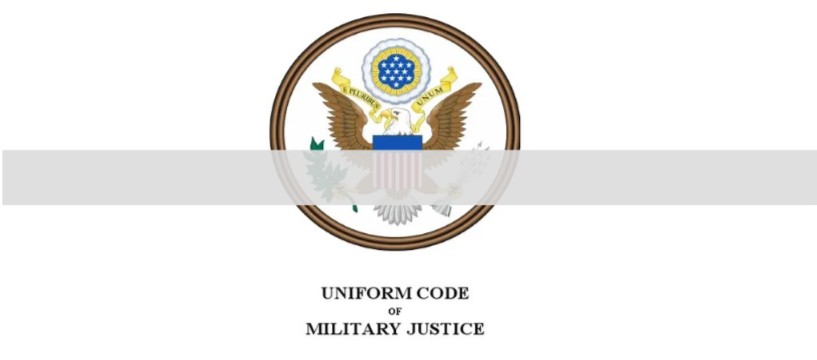
"Uniform Code of Military Justice" Joint Service Committee on Military Justice
Responsibilities of Soldiers
“My orders were that all atrocities would be reported and investigated according to the rules of the Geneva Convention, and it is our obligation to follow through and punish those atrocities.”
-United States General William Westmoreland, commander of U.S. forces during the Vietnam War
During the My Lai Massacre, Charlie Company soldiers were responsible for upholding the rights of Vietnamese civilians under international law.
"Report of The Army Review of the Preliminary Investigations Into the My Lai Incident - Volume I - Report of the Investigation - 14 March 1970" United States Department of the Army
By ratifying these conventions, the American military was legally obligated to follow their policies.
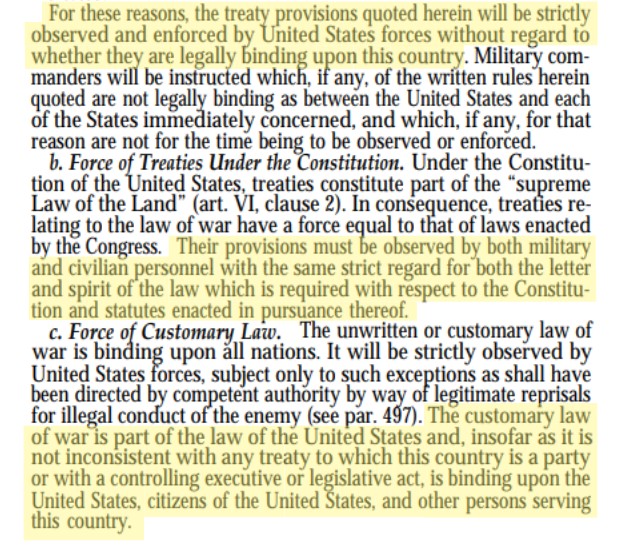
“FM 27-10, Department of the Field Army Manual, Law of Land and Warfare, 18 July 1956.” Department of the Army Washington D.C.
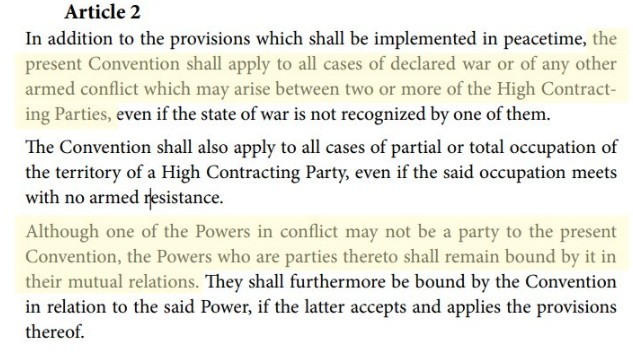
“The Geneva Conventions of 12 August 1949” International Committee of the Red Cross
In addition to international treaties, soldiers were also bound under responsibility by the Uniform Code of Military Justice, which governed their conduct.


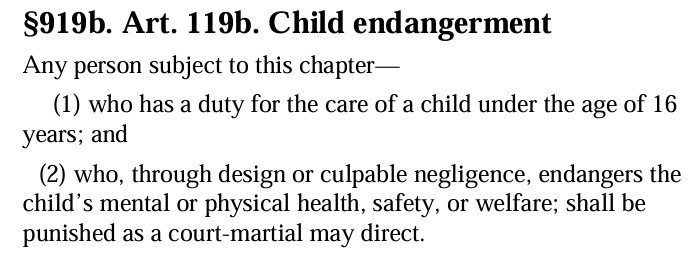
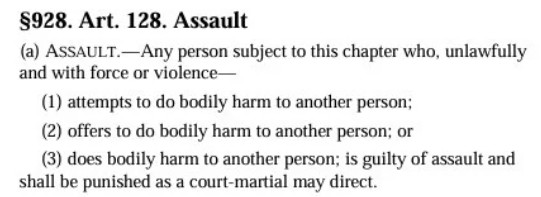

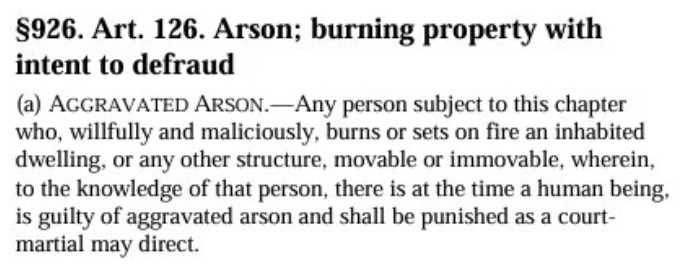
[ALL SIX] “APPENDIX 2 - UNIFORM CODE OF MILITARY JUSTICE.” Joint Service Committee on Military Justice
Charlie Company soldiers ultimately failed in their responsibilities to respect the rights of Vietnamese civilians.

"Report of The Army Review of the Preliminary Investigations Into the My Lai Incident - Volume I - Report of the Investigation - 14 March 1970" United States Department of the Army
Just Following Orders?
A central conflict during the trials was whether the soldiers were merely following orders from their commanders.
“Well, I was ordered to go in there and destroy the enemy. That was my job on that day. That was the mission I was given... I felt then and I still do that I acted as I was directed, and I carried out the orders that I was given, and I do not feel wrong in doing so.”
-Lieutenant William Calley
At the heart of this defense lay disturbing similarities with the Nuremberg Trials, which established an idea that, regardless if a soldier took direct initiative or followed orders, he remains culpable for his actions.
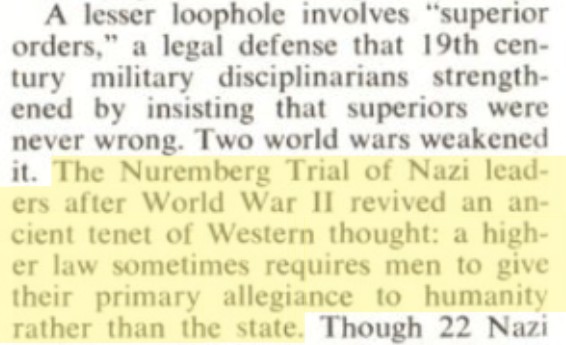
TIME Magazine, April 12, 1971, Vol. 97, No. 15, Pg 16
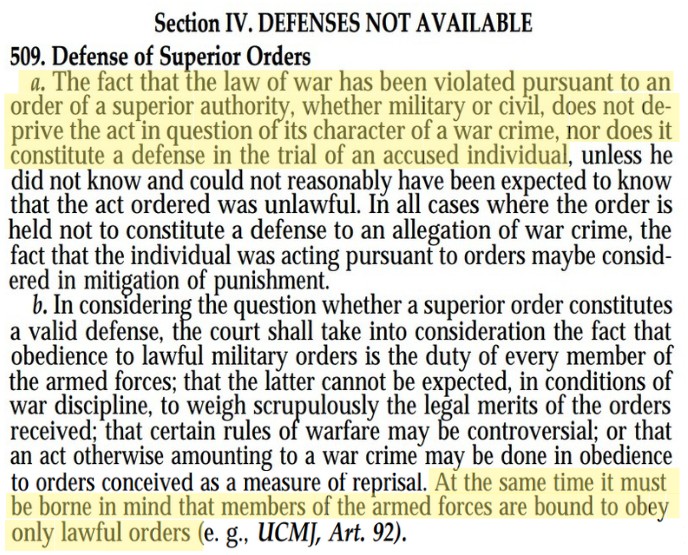
“FM 27-10, Department of the Field Army Manual, Law of Land and Warfare.” Department of the Army Washington D.C.
“The reasonable man would know and should know, without any doubt, that under the circumstances in which he found himself on the sixteenth of March, 1968, that any order to gather up over thirty people on that north-south trail, and to summarily execute those people is unlawful. A reasonable man not only would know it, he should know it, and he could not rely upon any order to commit that, to absolve himself of criminal responsibility for that conduct.”
-Prosecutor Captain Aubrey Daniels in his summation to the court
Soldiers were required to follow lawful orders, but also obligated to disobey unlawful ones. Therefore, subordinates should be held responsible for their actions.
“It was point-blank murder. Only a few of us refused. I just told them the hell with this, I’m not doing it. I didn’t think this was a lawful order.”
-Michael A. Bernhardt
“Lieutenant Calley ordered certain people to shoot these people, and I refused. And he told me that he was going to have me court-martialed when we got back to base camp. And I told him ordering me to shoot down innocent people, that’s not an order, that’s craziness to me. And so I don’t feel like I have to obey that. If you want to court-martial me, you do that—if you can get away with it.”
-Harry Stanley, Former GI of Charlie Company
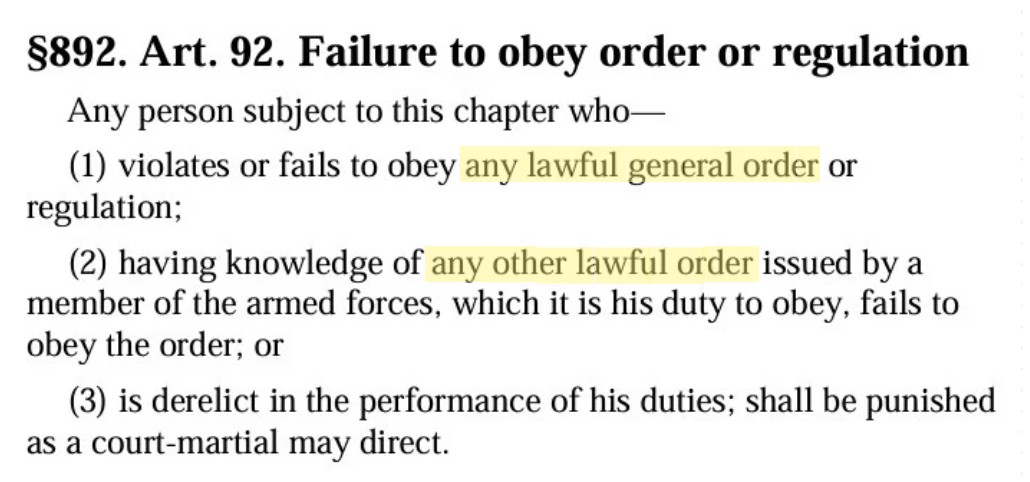
“APPENDIX 2 - UNIFORM CODE OF MILITARY JUSTICE.” Joint Service Committee on Military Justice
“Let's assume for the sake of the argument that he got an order to waste unarmed, unresisting people in the village of My Lai on the sixteenth of March. The military judge will instruct you that even that is not a justification for his acts, if the accused knew that that order was unlawful. For one to follow such an order, [one] has adopted the same criminal intent of the man who issued it. You're not absolved of your responsibility by the order. There are just two men guilty as opposed to one. The responsibility is joint. He joins in the same criminal purpose when he accepts and follows an illegal order. He has the same criminal intent of the man who gave the order.”
-Prosecutor Captain Aubrey Daniels in his summation to the court